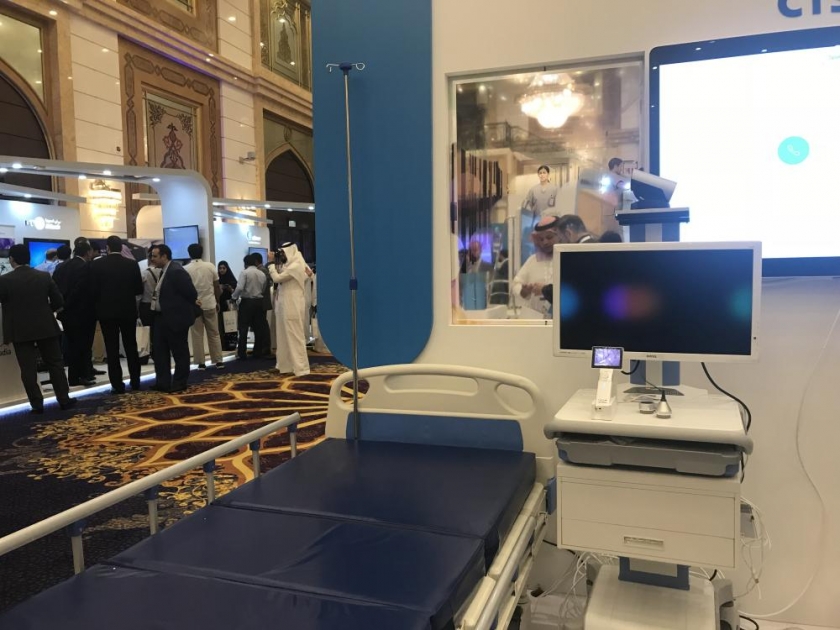
Cisco to launch smart city initiative in Riyadh
A smart city initiative will be inaugurated in Riyadh in the coming weeks after it piloted for nine months by networking company Cisco as part of the government’s digital transformation plans.
The pilot is being tested in Olaya district, the city’s busiest area, and plans to extend to other neighborhoods once the initiative succeeds, according to Cisco executives.
The district is currently set with smart parking, lighting, cleaning services, and networks of sensors “for a more sustainable way of living”, according to Haytham Al-Ohali, Cisco’s managing director in Saudi Arabia.
Working with the Riyadh Municipality and ministry of municipal and rural affairs, Cisco seeks to address the challenge of setting up a smart ecosystem amid heavy traffic and congestion.
Cisco, the Kingdom’s digitization partner, is going by an agenda called the Country Digitization Acceleration program launched nearly two years ago in line with the Kingdom’s National Transformation Program and Saudi Vision 2030.
Digitization can go a long way in solving solutions in several sectors.
For Cisco, it has been working with the Saudi government to roll out several digitization initiatives, namely in education, healthcare, broadband and city WiFi, and plans to work on others in the coming years, including smart hajj, energy, transportation, and cloud storage.
Cisco introduced an innovative virtual education solution to remote areas in different provinces in collaboration with the Ministry of Education.
Since the beginning of the current academic year, some fourteen virtual classrooms have been set up in seven cities around the Kingdom, with three broadcasting centers in Jeddah, Tabouk, and Sihat.
“In some schools located in remote areas, there’s a shortage of teachers to fill in for certain subjects, such as math, biology, chemistry, and such,” says Basel Tashkandi, project development manager at Cisco. “Virtual learning allows access to teachers across the Kingdom to meet those needs.”
He added “teachers encounter a significant safety risk when traveling long distance to and from remote schools that often have five to six students per class. Virtual learning solves this issue.”
Teachers use a virtual board from one of the centralized broadcasting centers that is synchronized with a board in the classroom. A video camera is set up in both locations for students to see the teacher and vice versa, creating a seamless interactive educational environment.
Cisco developers say this model can be extended to other parts of the country, including large cities where there are shortages in teachers in certain schools.
Moreover, in healthcare, a pilot testing telemedicine was launched across remote hospitals.
Telemedicine eliminates the problem of patients and their families traveling long distance to main cities, saving them cost and time to receive treatment.
Doctors and specialists from King Fahad Medical City are treating patients in remote hospitals, namely King Fahad Central Hospital in Jazan and Qurayyat General Hospital in the Northern Region.
In collaboration with the Ministry of Health, the telemedicine scheme seeks to reduce waiting times for patients and improve healthcare through the use of new technologies. The pilot has applied tele-consultation in internal medicine, pediatric, neurology, cardiology, ophthalmology and rehab.
“There are several results from this pilot,” says Faisal Alkhateeb, managing director of Kaizen Medical Technology, presenting a telemedicine room kit with connected devices. “There’s an immediate impact in decreasing the number of patient visits, saving costs in travel, and better quality of healthcare because patients are treated by specialized doctors without waiting times.”
He further said “access to healthcare is easier and faster for patients around the Kingdom. There was one case in Jouf where instant diagnosis saved a patient’s life by treating a critical condition without waiting time.”
Although such advancements have been applied in different countries around the world, it is the first for the Kingdom as it heads towards digital transformation.
Cisco has signed a Memorandum of Understanding (MoU) with Saudi Arabia to support its plans towards digital transformation aligned with Vision 2030. Earlier this year, STC signed an MoU with Cisco to collaborate on the developing 5G communication systems and networks. The transition to 5G prepares for future solutions including smart city, IoT and other vertical services. During an earlier visit of Deputy Crown Prince Mohammed bin Salman to the United States in 2016, Cisco signed an MoU with the Saudi Ministry of Commerce and Investment that sets a roadmap for an accelerated pace of digital transformation in the Kingdom.


























